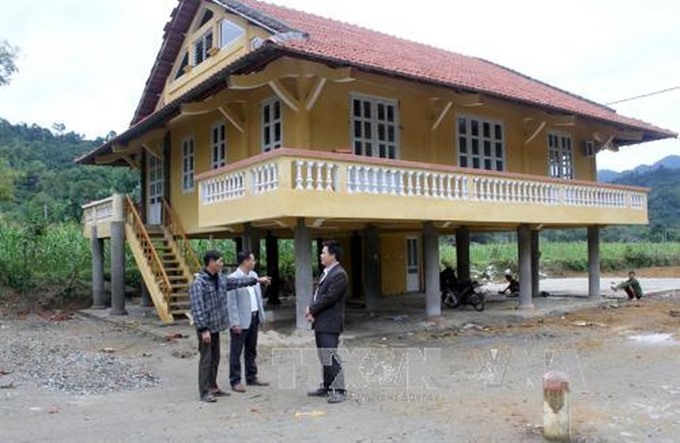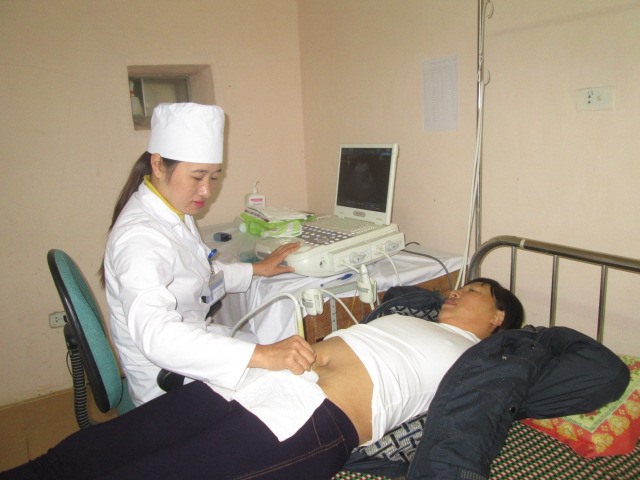 |
| For the community: A cultural house built on land donated by a Tay farmer. Photos Nguyen Van Ty |
Viet Nam News
By Ha Nguyen
The Vietnamese should never forget President Ho Chi Minh’s Appeal for Patriotic Work Emulation, issued 70 years ago.
Back in the spring of 1948, the country was struggling as it waged its resistance war against the French. To encourage the entire nation to contribute to the war, President Ho Chi Minh made an appeal for patriotic work emulation on June 11, 1948.
Opening the appeal he wrote: “The purpose of patriotic work emulation is to eliminate poverty and hunger and illiteracy and foreign aggressors. It means our entire people have enough rice to eat and clothing to wear. The entire population will know how to read and to write. The soldiers will have enough food and weapons to defeat the foreign aggressors. These are aimed to unite the entire nation. Thus we will have an independent nation, free civil rights and happy welfare of the people."
Seventy years have passed, but the appeal he made in June 1948 as the country fought to defeat the French while building a stable future, always promotes the work emulation of every Vietnamese even in the peace time.
There are many vivid stories of the Vietnamese people following President Ho’s words.
When implementing new rural programme, Don Thai, a remote village of the northern province of Tuyen Quang has been granted 50 per cent funding (by the State) to build a cultural house; the rest was contributed by locals.
However, the village lacks level ground because almost all land in the area is hilly or mountainous.
Nong Quang Cang, 65, an ethnic Tay farmer in the village, was the first to donate 800sq.m of his own land to build the house. There, villagers meet with each other to exchange views on music and art, and methods to boost production to eliminate poverty and hunger.
“My family is poor and has received State support for years. However, when the village needed a plot of land to build the cultural house, where all villagers including me and our younger generations, will benefit, I immediately decided to donate my land,” said Cang.
Thanks to Cang, the cultural house was built on stilts in a traditional Tay style. It was completed by the end of last year.
Villager Nong Van Chi said, “We are very happy since we got the spacious cultural house where we can meet, and technicians can organize training courses to popularize strategies and technology to boost production among local households.
“It is particularly that sports and exchanges of views on culture have strongly developed,” he said, noting that following Cang’s example, he also donated 400sq.m to build a rural road.
 |
| Hero in scrubs: Dr Le Thi Hong Nhung does a medical check-up for a patient. |
Nong Quang Du, head of Don Thai Village, said, “In the past, when having a meeting, we have to borrow a local’s house. It was very inconvenient. Thanks to Cang, now children have a very nice place to play ping pong, dancing and many other cultural activities.”
“But the most important thing is that Cang is a bright example for locals to follow in an effort join the programme in building a new rural area in Don Thai Village,” Du said.
As a result, 25 households have volunteered to donate land to build roads in the village. With assistance from local government, almost all roads in the village were now concreted over. This makes it easier for locals to travel and bring farming machines to the fields, Du said.
Making use of a different set of skills and resources than Cang but acting under the same selfless impulses, Dr Le Thi Hong Nhung, 30, has volunteered to work at a remote clinic centre in Tam Duong District in the northwestern province of Lai Chau.
Working at the Infectious Diseases Department, Nhung faced many infectious diseases such as Tuberculosis (TB) and HIV.
“First I was very worried that I would be affected by these diseases but I remembered President Ho’s words: A medical worker should act as a gentle mother. I always have a hospitable attitude towards my patients, treating them with not only my medical duties but also with my sympathy to share with them when they suffer pains,” said Nhung.
She recalled, “Once I conducted a medical check-up for a man who was battling adenitis, but tests showed that he had HIV. The patient’s spirit completely fell into decay. With a thoughtful attitude, I encouraged him and guided him on how to take the right medicine. I sometimes wander up hill and down dale to his house to take care of him.”
As a result, the man has overcome all terrors and recovered healthily.
His wife said, “Thanks to Dr Nhung, my husband now goes to work while drinking medicine to treat the ailment. The most important thing is that he doesn’t want to die as before.”-- VNS
OVietnam